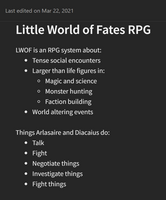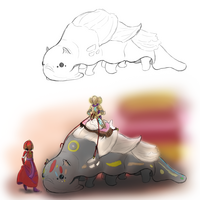LWOF's Design Pillars



Clickbait Title: Top 5 Things That I Hate About Other TTRPGs!
When I set out to write Little World of Fates about a year ago, I wanted to make a TTRPG that was tuned exactly to my aesthetics -- a character-focused fantasy political drama. I wanted to appeal to the people who are both powergamers and who love roleplay, so they could co-exist within a space without either feeling stifled. And most of all, I wanted the end product to reflect my worldbuilding. (I adore the World of Fates, if you couldn't tell from me finishing two games in it over the last two years and starting many more... I hope you'll come to adore it too!)
Ludonarrative Fit
This term is bandied about a lot in the game design space but for anyone who doesn't know: Ludonarrative Fit is when the game mechanics reflect the story of the game. In order to maintain ludonarrative fit when making LWOF, I started by making a list of things people do in the stories about my world currently. Unsurprisingly for someone who adores political fantasies, it was a lot of charged conversations, sideways smirks, investigations, with only a spark of violence.
This made me think about how in the Pathfinder campaign I'm in right now, we're basically running a political campaign but this means, about 80% of the time, no one uses any of their combat features. I throw no fireballs, the swordsman's blade stays sheathed, and the paladin doesn't smite anyone. It almost seems like a waste to do all this elaborate combat-character building if we just... talk.
So in LWOF, even the Attributes (Power, Performance, Intelligence, Spirit) are focused on diplomacy and negotiation. Can Power and Performance be used in Combat? Absolutely. But on the whole, the names of the stats were picked to represent things you need to negotiate in a fantasy courtroom. The skill names (i.e. Intimidation, Deception, Theatrics, two separate Persaussion skills, etc.) are entirely focused on these negotiations. The absence of skills like Pick Lock, Animal Handling, Acrobatics, and so forth helps solidify what the system is about -- though, much like any TTRPG, you can wrangle these checks out of the system if you so desire still. (Pick Lock could be Performance + Intelligence, for example.) The entire Faction system is something that can break other TTRPGs, so in this, it was there from the ground level. The Encounters section describes how to run mock-UN meetings and mock-trials, with combat only as a last resort at the end. And while diplomacy is many rolls, combat should only be one or two before the whole scene is resolved. All of these features ensure you feel the weight of diplomacy and the minimization of other aspects of TTRPGS.
Wargaming AND Theatre of the Mind...
If Twitter is any indication, it seems as if there are two camps of people these days -- those who primarily want TTRPGs to be about Theatre of the Mind and those who want it to be a war game with SOME roleplay elements. When I considered how much CRUNCH I wanted in my system, I knew I wanted to appeal to people who really like the min/maxing, wargaming elements -- after all, my immediate TTRPG groups are mostly those folks. However, I am not a fan of super crunchy systems -- D&D 3.5e is about my limit. Furthermore, if you add all these gameplay systems to negotiations, you don't ACTUALLY feel like you're negotiating -- you feel like you're playing a wargame that you reskinned as a negotiation. So, I kept the system on the much lighter side -- Every Attribute is just the size of the die you roll, every check is rolling two dice and seeing if they're larger than a DC. The Factions are basically just character sheets with slightly bigger numbers. It's all elegant, streamlined, and easy to remember -- or at least, that's the goal.
But Wait! How do you be Character Focused if you can't customize your character?
My biggest gripe with a CERTAIN very large TTRPG (Yes, it's the BIG one you're thinking of) is that there is not enough customization. I feel as if I end up thinking of a cool character and then smashing all these different class features and feats awkwardly to try to make them. And some things just aren't viable in the balance of the games I play, even if it's "what my character would do". You might say, "Well, just write an interesting character and reflavor their class to whatever!"
Yes, I could do that. But that hurts my narrative designer soul. The game isn't DESIGNED to handle that. Yes, I can REdesign it to handle that but that's also incumbent on the DM and such too.
I didn't want people feeling as if they had to sacrifice their character options on the Altar of Playing Optimally. So, I dropped classes in favor of a Feats Only system. Every level, you just take a Feat that gives you something cool you can do. This allows you to make your character WHATEVER you want (if it makes sense within the worldbuilding) and also have the mechanics to support it. You wanna be a Princess with a dagger in her ballgown that she pulls out to point at her dark but handsome love interest from a foreign land? You can just BE a landed aristocrat at the start -- then take Assassin and then ask someone to be your prince. You wanna be a magical philosopher-automaton with nukes in your fingers? Cool, you can be that too. This also appeals to the power gamers, who can min/max their combinations. However, with the help of my co-writer, I tried to ensure all the Feats were more-or-less equal in power -- and taking different, uncoordinated chunks of power would still result in you building a viable character.
Worldbuilding Inseparable from the Mechanics
As I mentioned in my introduction post, in 2016, I wrote a 100-something page homebrew campaign setting in Dungeons and Dragons 3.5e, complete with a whole rewrite of the entire Player's Handbook, rebalancing all of the classes, and reflavoring everything to try to match the vision of my 6th World, at the time. But the 6th World was a world about the struggle between nature and man, the fight for independence from society's expectations, and kindness. D&D can be manipulated to be about anything, but the mechanics didn't suit the spiritual nature of magic in the 6th World. It was FUN but it didn't FEEL right. This failure led me to build LWOF the way I did.
I've already covered how I focused on diplomacy, faction-building, and such. However, Jay encouraged me to take it even further -- as such, the Bloodline and Origin Feats and the Economy map were born.
The Bloodline and Origin Feats are very specific to my world, and tie your character to a specific culture that is largely inextricable from the gameplay. The way the Economy works is you control Supply Lines on a map -- and these roads are balanced to work on the map of my world. These are really salient ways that the gameplay is tied to the story. It's difficult to play a generous, kind Nouveau Thuillean when they're mechanically designed to sap one's Mental Energy every time they talk. It's difficult to say that the Empyre and Saegens get along when the road between their capitals is treacherous. Worldbuilding is more than just a skin you put over whatever mechanics you're using -- it needs to be concretely affecting every moment of gameplay.
Of course, if you decide to homebrew your own world, the tools to begin are also included in LWOF! :D (I love introducing new people to worldbuilding!)
Safety and Amusement
Something I haven't mentioned much yet but is incredibly important to my design philosophy is the emotional safety of players. After being in several different political campaigns, I've seen the social fall-out when people can't separate the game from reality. ("How dare you betray me!" / "My character betrayed YOUR character, I didn't betray you"...) So, I made safety a priority--the very first thing in the book is about communication and consent.
I also wanted to people feel safe to play, regardless of their race, gender, ability, or sexuality, and specifically called this out in the character creation. Though I think gendered and sexual-orientation-locked mechanics are tacky as hell, I do believe cultural backgrounds and biology should have some sort of effect on gameplay (i.e. Selkies turn into seals, humans do not. Blind people cannot see, people with working eyes can, etc.) I watched my language carefully and had friends of different backgrounds and abilities look it over to ensure I wasn't degrading or misrepresenting something. I won't claim I handled everything perfectly, but I think it's better to try and fail than put no effort into having this conversation at all. I hope you all will feel safe in this space as well.
And those are the pillars!
Thank you so much for reading! I hope you understand my vision a little better after reading this document and that you're excited for December 15th, 2021, when LWOF and all its future expansions will be available for just $9.99! Don't forget to Like, Comment, and Follow or something something call-to-action marketing, etc.!
Stay safe out there!
Get Little World of Fates
Little World of Fates
A Faction-building TTRPG about Politics, Betrayal, and Friendship
| Status | In development |
| Category | Physical game |
| Authors | Amaiguri, JaySmile |
| Genre | Role Playing |
| Tags | Character Customization, Fantasy, Folklore, LGBT, LGBTQIA, Narrative, Nonlinear, political, Tabletop role-playing game |
| Languages | English |
| Accessibility | Color-blind friendly, Subtitles |

Leave a comment
Log in with itch.io to leave a comment.